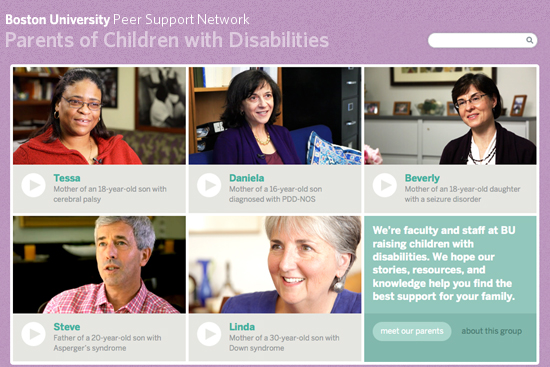Help for Parents Caring for Children with Disabilities
New BU website shares stories, resources

The new Parents of Children with Disabilities website steers readers to resources and services and offers parent-to-parent advice for those at the University with disabled children.
Most parents are familiar with the stresses of child rearing, but there is a special set of tribulations known only to parents of children with disabilities.
A 2009 study by researchers at the University of Wisconsin–Madison found that the physiological and psychological toll on mothers raising autistic children is significantly greater than that on mothers of children who with no disabilities, and that the chronic stress experienced by mothers of autistic children is similar to that of combat soldiers.
Parents of children with disabilities, for example, face a host of questions that most parents never have to address: Should I set up a special needs trust? How can I help my son or daughter navigate the confusing world of dating? Will my daughter ever be able to live on her own?
To help answer those questions and many others, a group of University faculty and staff members has launched the website Parents of Children with Disabilities. The site, which requires a BU Kerberos password to log in, steers readers to resources and services and offers parent-to-parent advice for those at the University with disabled children.
One of the driving forces behind the site is Linda Wells, dean of the College of General Studies, whose 30-year-old son Dominic has Down syndrome and is on the autism spectrum.
“This website is an easy way for parents of disabled children to connect and to realize that they are not isolated,” says Wells. “It’s helpful just to be able to talk to someone else. Parents, regardless of their child’s disability, face many of the same issues, like their child’s independence, education, and employability.”
The idea for the website came to Wells after she talked with a colleague whose daughter is disabled. He shared his family situation and feelings of stress and uncertainty.
“As I walked away I thought, we ought to be able to do something within BU,” says Wells, who will step down from her position as dean at the end of spring semester. “We could build something where parents could share their path and their choices, and the network would be especially useful for parents who have younger children.” Wells will continue to work at the University as an advisor on student career development and alumni relations.
Wells has served on Down syndrome advisory boards and is a member of the Greater Boston Arc, the Boston chapter of a national organization that helps people with intellectual and related developmental disabilities and their families. She took her idea of a parent network to Provost Jean Morrison and other deans, who offered their support. She then enlisted the help of Stephen Burgay, BU’s senior vice president for external affairs, the father of a 21-year-old son with Asperger’s syndrome. Wells and Burgay came up with the idea of posting video testimonials on a BU website, and they asked colleagues if they would be willing to share their stories.
“We wondered how we could let parents know they have colleagues that have been dealing with a similar set of issues and might be able to provide support or advice,” says Burgay, who is on the board of directors of the Asperger’s Association of New England. “There is a group of parents on campus who are very knowledgeable about this topic, and we wanted to give people the opportunity to identify parents in a similar situation. That’s where the website and the videos came from.”
Wells says the site, which took months to create, successfully personalizes parents’ stories. “The videos help put a face to a name and show that we are approachable, and that way people are more inclined to reach out to us,” she says.
Each parent also shares a list of organizations they’ve found helpful, such as the state’s Department of Developmental Services, special summer camps, and financial relief funds.
The site currently features videos of five parents, filmed by BU’s Marketing & Communications department, and Wells and Burgay hope that more will choose to share their stories. The site also offers the counseling services of Karen Brouhard, a Faculty & Staff Assistance Office counselor, and Kimberly DelGizzo, director of the Center for Career Development.
In her video, Wells shares stories of Dominic’s experience in school and his “mischievous” ways. “We’ve always taken it one step at a time,” she says. “I would be eager to talk to people and listen to people and to say, this is what I’ve done, and mostly to hear what people’s worries are.”
In another video, Beverly Guiry, director of project management for Information Services & Technology, discusses her daughter’s struggle with a seizure disorder and the joy she felt when her daughter found a job.
“This is a journey and at different ages my child has had different issues to face,” says Guiry. “It’s hard being in a different world and not knowing many people who are in the world we are in. My child is older now, but if this website had existed a few years ago, I would have used it to reach out.”
Parents interested in sharing their stories on the website should contact Linda Wells at lwells@bu.edu or Stephen Burgay at burgay@bu.edu.
Comments & Discussion
Boston University moderates comments to facilitate an informed, substantive, civil conversation. Abusive, profane, self-promotional, misleading, incoherent or off-topic comments will be rejected. Moderators are staffed during regular business hours (EST) and can only accept comments written in English. Statistics or facts must include a citation or a link to the citation.